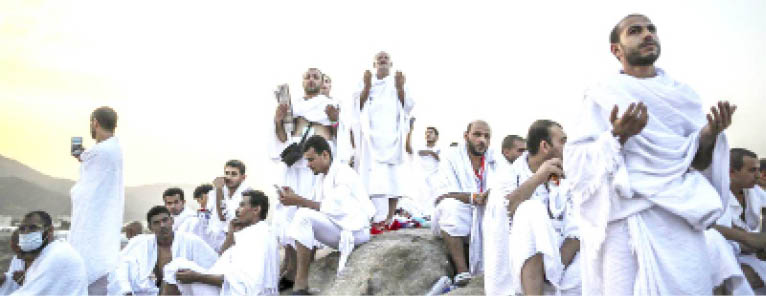One million Muslims will, today, gather at the sacred hill of Mount Arafat, near the holy city of Makkah in Saudi Arabia, for an intense day of worship and reflection on what is considered the climax of the Islamic Hajj pilgrimage.
Dressed in white garments, which are meant to signify unity regardless of social status or nationality, the pilgrims will stay on Mount Arafat from dawn until dusk, spending the day praying and reciting the Quran.
It is believed that Mount Arafat is where Prophet Mohammed (SAW) delivered his final sermon around 14 centuries ago, calling for equality and unity among Muslims.
One of the largest religious gatherings on earth, the second day of the Hajj is often the most memorable for pilgrims.
They stand shoulder to shoulder with Muslims from around the world seeking God’s mercy and blessings after spending the previous night in prayer and meditation in the tent city of Mina, around 7 kilometers north-east of Makkah.
At sunset on Arafat day, the pilgrims will head to the nearby area of Muzdalifah in the plains, where they will also collect pebbles to use for a symbolic stoning of the Devil ritual in the desert valley of Mina.
The ritual is a recreation of the Prophet Ibrahim’s stoning of the devil after he tried to persuade Ibrahim to disobey God’s order to sacrifice his son, Ismael.
After the ritual, pilgrims will sacrifice animals to mark the beginning of the four-day Eid al-Adha holiday.
The spiritual exercise began yesterday with hundreds of thousands of worshippers circled Islam’s holiest site, the Kaaba at the Grand Mosque in Makkah. Many held umbrellas to block the sun as the temperature climbed to 42C.
Muslims are expected to perform the Hajj, one of Islam’s five pillars, at least once in their lifetime, provided they are fit enough and have the financial means to do so.
Saudi authorities have mounted a massive operation to ensure the health and safety of pilgrims. The Saudi Health Ministry has prepared 23 hospitals and 147 health centres in Makkah and Madinah, the second-holiest city in Islam, to accommodate pilgrims.
One million fully vaccinated Muslims, including 850,000 from abroad, are allowed at this year’s Hajj, after two years of curtailed numbers because of coronavirus pandemic restrictions.
In 2019 about some 2.5 million Muslims from around the world took part in Hajj, but after that, the pandemic forced a downsizing. Only 60,000 fully vaccinated residents of the Kingdom took part in 2021, up from a few thousand in 2020.

 Join Daily Trust WhatsApp Community For Quick Access To News and Happenings Around You.
Join Daily Trust WhatsApp Community For Quick Access To News and Happenings Around You.
